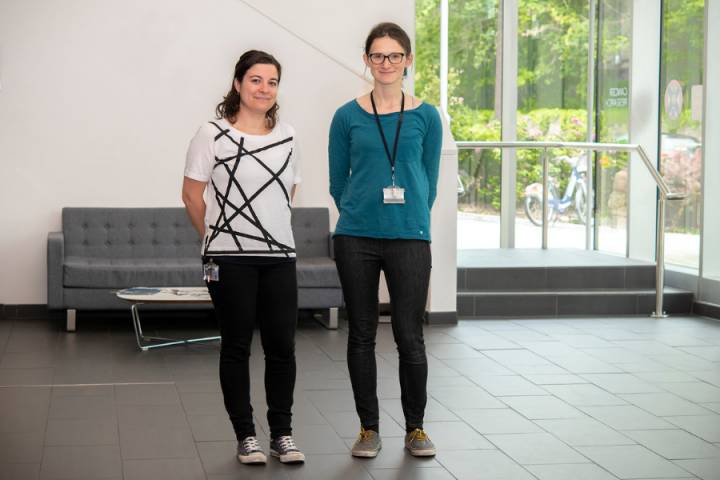Inaugural Hastie Career Advancement Awards given to IGMM postdocs
Carmen Amador and Magda Maslon, postdoctoral researchers at the MRC Human Genetics Unit, have received inaugural awards from the Hastie Career Advancement Fund.
The Fund was launched in 2018 to honour the legacy of Emeritus Professor Nick Hastie and supports talented early-career scientists at the Institute of Genetics and Molecular Medicine (IGMM) to progress in their careers. As former Director of the Institute and the MRC Human Genetics Unit, Professor Hastie played an active and inspirational role in the careers of hundreds of research scientists and continues to do so through the Fund. A committee of current IGMM researchers assessed the applications to select the winners.
I am delighted to congratulate Carmen and Magda on being the well-deserved recipients of the inaugural Hastie Career Advancement Awards. I read their proposals with much interest and look forward to future discussions about their exciting science and career paths.
We recently spoke with Carmen and Magda to find out more about their awards.
Carmen Amador, Chris Haley Research Group, for ‘Measuring contribution of Genome-by-Environment interactions to obesity variation in the population’.
What is your research focus?

“The effect of genetic and environmental factors on disease, particularly in obesity related phenotypes. Despite the known influence of both genetics and environmental factors, little is known about how they interact with each other. My objective is to model genome-by-environment interactions (GxE) and estimate how much of the variation in obesity is due to the fact that genes may have effects that differ according to the environment in which a person lives. This has important implications for precision medicine, like phenotypic prediction of disease, and can help us understand better the genetic architecture of obesity and other complex traits.”
How will the Hastie Career Advancement Fund contribute to your work?
“Much of the genetic work done in obesity does not incorporate environmental information because it is difficult to measure. My aim is to the find proxies to this information. The fund will allow me to get access to a population cohort that has measurements of microbiome and methylome information so I can explore how they are connected with the environment and how they can inform and improve our genomic studies. I am also visiting University of Groningen in the Netherlands to learn about the challenges associated with the data and discuss proposals for future research and potential for collaborations.”
What makes the Hastie Career Advancement Fund an important initiative for people at your career stage?
“Having the opportunity to develop our own projects is vital to define career direction, providing a strong base for future funding applications. This, combined with the opportunity to receive support from an inspiring researcher like Professor Hastie, offers a fantastic framework to consolidate as a leader.”
This is an exciting time to be a scientist, particularly in the biomedical sciences. The precision medicine era is becoming a reality and it is a wonderful opportunity to be able to contribute to it.
Magda Maslon, Javier Caceres Research Group for ‘The role of transcription elongation rate in genome stability’
What is your research focus?
“DNA in genes is transcribed to make messenger RNA (mRNAs) by RNA Polymerase II (RNAPII). My research focus is gene expression regulation at the RNA level. I am using a mouse model of RNAPII to understand how transcription rate influences production of mRNAs and consequently cellular and organismal homeostasis.”
How will the Hastie Career Advancement Fund contribute to your work?
“Living cells have to replicate DNA before they divide, to ensure that daughter cells receive an identical copy of the genetic material. Both transcription and replication use the same DNA template. Conflicts between these two processes might result in DNA damage and can contribute to diseases such as cancer. I will use the award to unravel whether the transcription elongation rate regulation provides the mechanisms to prevent such conflicts and hence ensure genome stability.”
What makes the Hastie Career Advancement Fund an important initiative for people at your career stage?
“It can be very daunting to make first steps to transition into independent scientific career. The Fund provides an inviting, low-risk platform for gaining essential skills, including independent thinking, budgeting or grant-writing. The regular meetings with Professor Hastie are an integral part of the award for an opportunity to get focused and individual support. The Fund also enables producing preliminary data, which can greatly help in securing future funding.”
We face an increasingly hard struggle to ‘make it’ in academia. The Institute has been great at recognising our challenges and providing a concrete initiative that provides mentoring and help to hone grant-writing and independent thinking skills.
To find out more about the Hastie Career Advancement Fund or for information on how to donate, visit the Hastie Legacy webpage.

